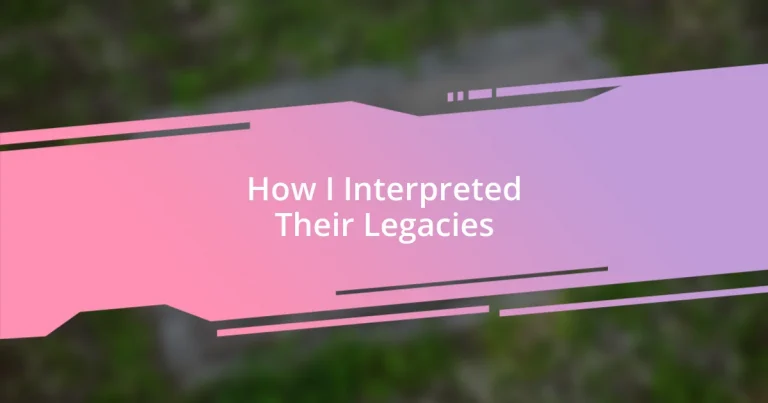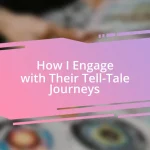Key takeaways:
- Historical legacies shape our understanding of present struggles and inspire personal connections to advocacy for justice and equality.
- Key figures like Gandhi and King influence our values, teaching lessons in perseverance, nonviolence, and the importance of character in the fight against injustice.
- Modern relevance of historical figures like Malala Yousafzai and Eleanor Roosevelt highlights the ongoing need for advocacy in human rights and education within contemporary society.
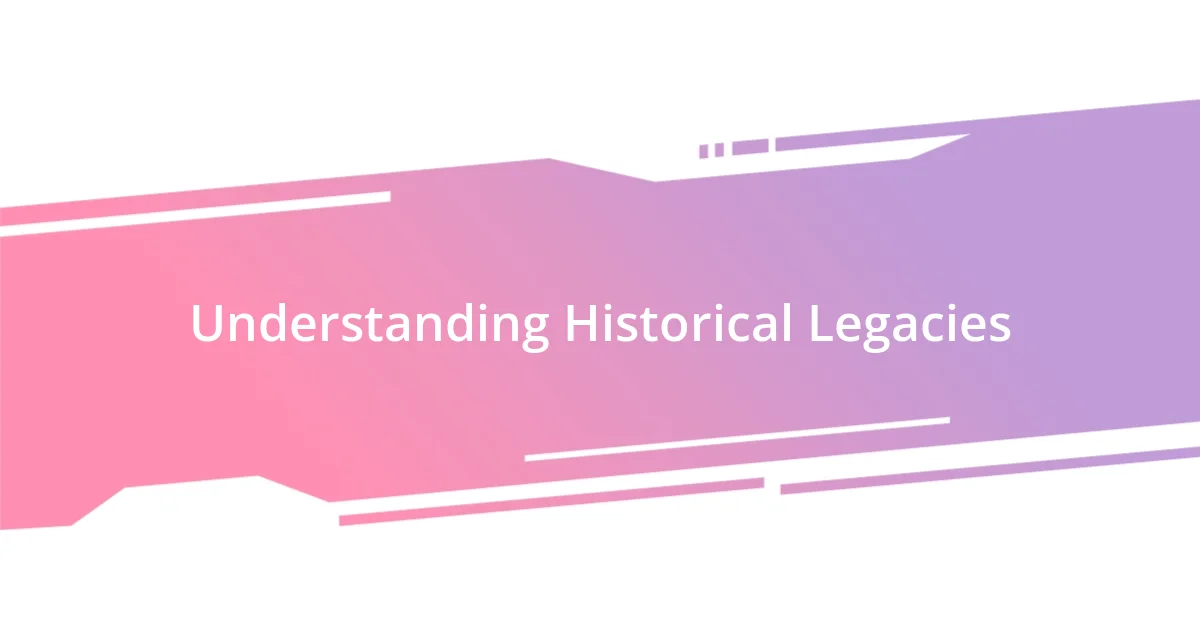
Understanding Historical Legacies
Understanding historical legacies is a complex task, often colored by the perspectives we bring to them. When I reflect on how certain figures shaped our world, I realize that their contributions are not just records of achievements but also a tapestry of human emotion and ambition. Have you ever noticed how the legacies of leaders can inspire both admiration and resentment?
Take, for instance, my personal experience with the legacy of Martin Luther King Jr. His powerful speeches and unwavering commitment to justice speak to me on a deeper level, reminding me of the struggles still present today. It’s fascinating to consider how a single individual can ignite change and yet leave behind a legacy that is interpreted through vastly different lenses. How do we reconcile the greatness of their vision with the shortcomings of their actions?
Moreover, I often ponder how history is not merely about past events but a living narrative that influences our present. For example, the legacy of colonialism still shapes global dynamics today. As I explore these legacies, I find myself questioning what responsibility we bear in either perpetuating or challenging these narratives. How can we engage with history critically while also honoring the experiences of those who came before us?
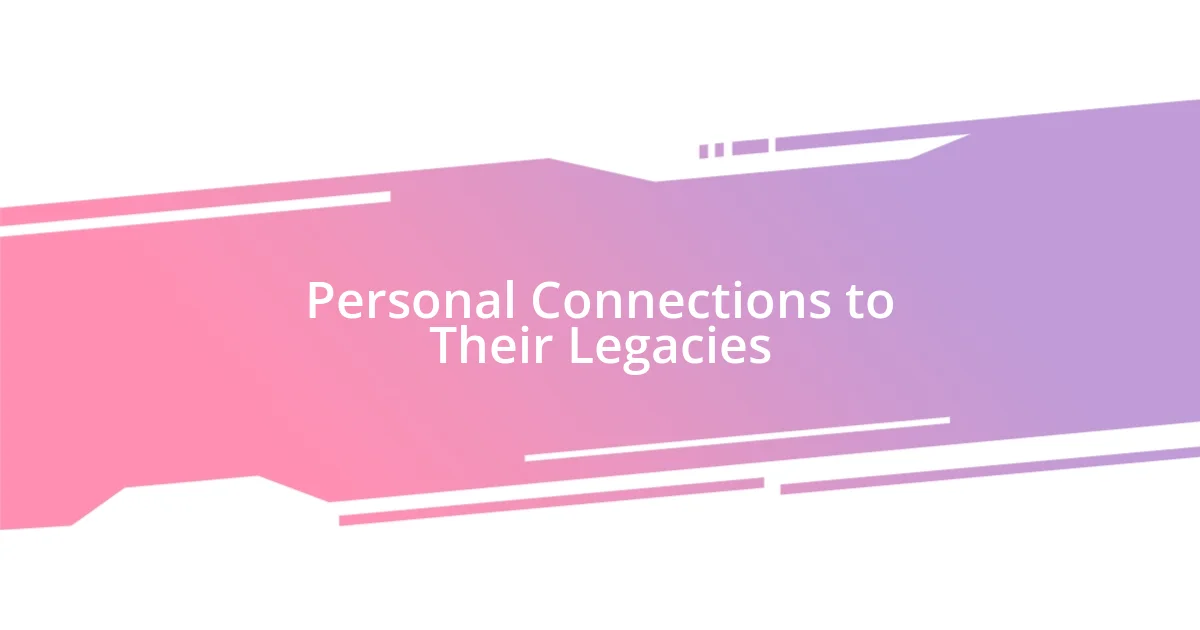
Personal Connections to Their Legacies
When I think about the legacies left behind by significant figures, I often reflect on how their stories intertwine with my own experiences. For example, I remember the first time I read about Nelson Mandela’s journey. I felt an immediate connection—not just to his fight against apartheid but also to my own struggles for acceptance and equality in my community. It’s a poignant reminder that legacies can inspire us personally, pushing us to advocate for justice in our own lives.
- Connecting history to personal experiences can deepen our understanding
- Engaging with a legacy can inspire us to take action
- Reflecting on historical figures helps clarify our values and aspirations
- Personal anecdotes make historical narratives relatable
- Exploring legacies can invoke emotional responses that drive change
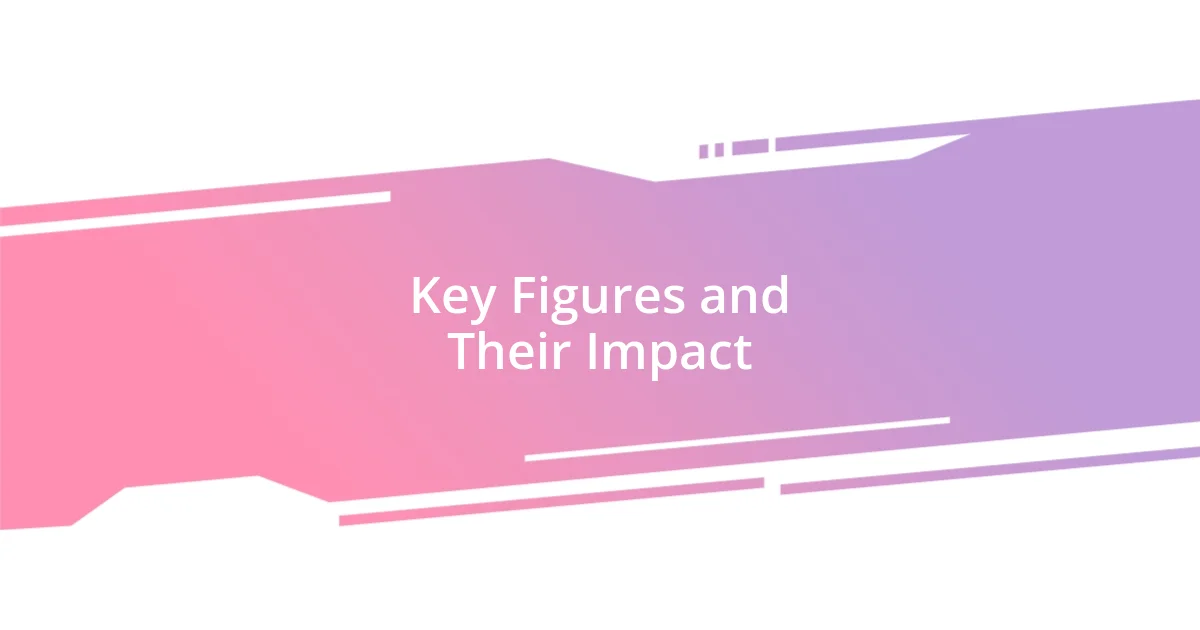
Key Figures and Their Impact
When diving into the legacies of key historical figures, I often find myself struck by the profound impact they had on societal norms and values. For example, Mahatma Gandhi’s philosophy of nonviolent resistance resonates with me deeply. Growing up, I faced moments of conflict that tested my own values. Gandhi’s approach taught me that courage doesn’t always roar; sometimes, it’s the quiet voice at the end of the day saying, “I will try again tomorrow.” How many of us have drawn strength from such powerful legacies?
Similarly, I reflect on the contributions of figures like Marie Curie, whose pioneering work in science not only broke barriers for women in STEM but continues to influence the field today. When I learned about her relentless pursuit of knowledge amidst adversity, it mirrored my own journey in pursuing a career that pushes boundaries. Her legacy motivates me to embrace challenges while working toward my goals, reminding me of the importance of perseverance in the face of obstacles.
Lastly, I can’t help but consider the complexities of legacies such as those left by Thomas Jefferson. His authorship of the Declaration of Independence is celebrated, yet his paradoxical relationship with slavery invites ongoing reflection. As I navigate discussions around freedom and equality in my life, I often return to Jefferson’s legacy as a case study in how our heroes can embody both inspiration and contradiction. Isn’t it fascinating how we can be inspired while simultaneously grappling with the darker aspects of these figures’ histories?
| Key Figure | Impact |
|---|---|
| Mahatma Gandhi | Pioneered nonviolent resistance, influencing global movements for peace and civil rights. |
| Marie Curie | Advanced scientific understanding and opened doors for women in science, showcasing resilience in a male-dominated field. |
| Thomas Jefferson | Authored the Declaration of Independence, symbolizing ideals of freedom while also representing the contradictions of his personal life. |
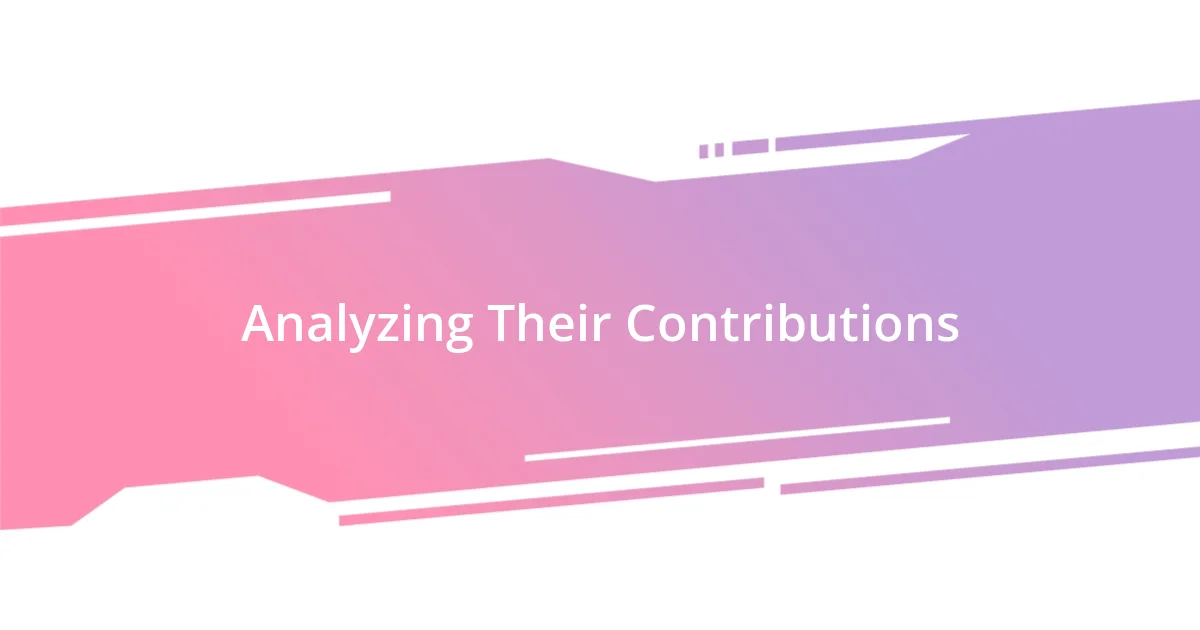
Analyzing Their Contributions
When I reflect on the contributions of historical figures, I often feel a mix of admiration and introspection. Take Martin Luther King Jr., for instance. His “I Have a Dream” speech moved me to reconsider my own dreams for the future. I remember standing at a community rally, feeling the weight of his words urging us to seek justice and equality. It raised the question: How can we channel such powerful legacies into our unified action today?
Similarly, I find myself profoundly inspired by the writings of John Locke. His theories on natural rights made me rethink my own understanding of freedom and governance. I once engaged in a heated debate over civil liberties at a local forum, and Locke’s ideas about the social contract became the bedrock of my arguments. In moments like these, I can’t help but wonder: How can we better apply these foundational concepts to our current societal struggles?
Then there’s Frida Kahlo, whose art expressed deep personal pain and resilience. I vividly recall visiting her exhibition and feeling her raw emotions resonate with my own conflicts. Kahlo’s capability to transform suffering into beauty has prompted me to reflect on my creative processes. What does it mean to create out of pain, and how can her legacy inspire us to turn our challenges into art? Such questions deepen my appreciation for her contributions and compel me to continue exploring my own artistic voice.
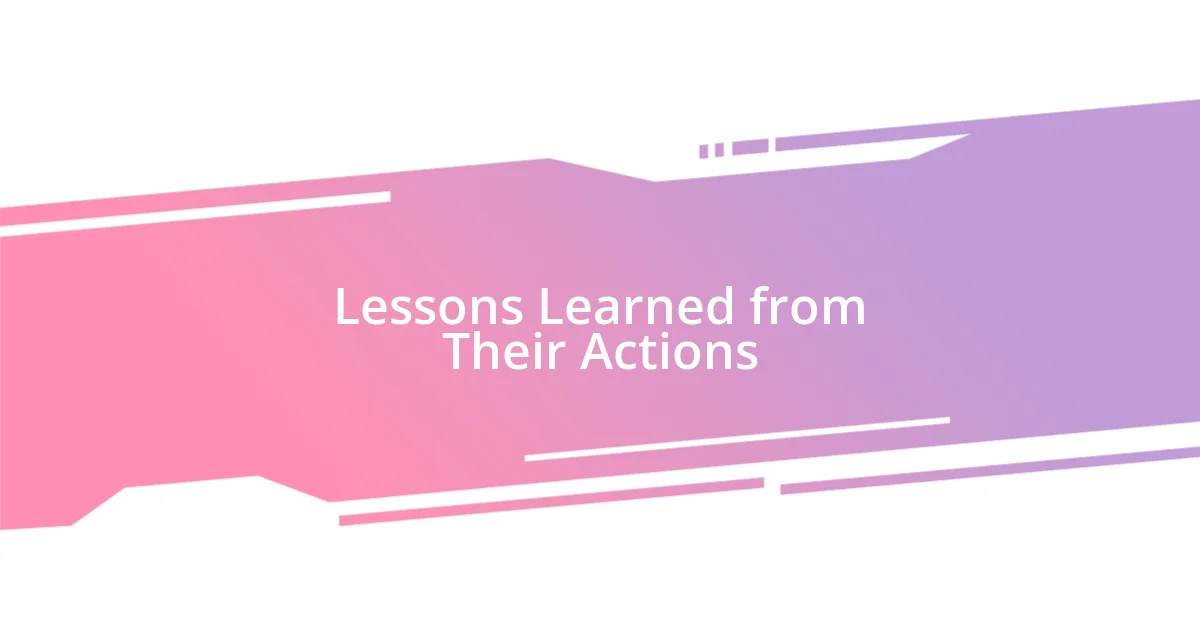
Lessons Learned from Their Actions
The actions of influential figures often offer poignant lessons that resonate through time. I clearly recall a discussion in my college class about Nelson Mandela’s ability to forgive and unite a fractured nation. It made me reflect on my own conflicts with friends. How often do we let small disagreements fester, when perhaps forgiveness could mend those rifts? Mandela’s legacy taught me that true strength lies in reconciliation and understanding, not just in winning arguments.
I remember a quote from Maya Angelou that profoundly impacted my perspective on advocacy: “I’ve learned that people will forget what you said, people will forget what you did, but people will never forget how you made them feel.” This understanding has spurred me to approach conversations about sensitive topics with empathy. Each time I engage others in discussions about equality or justice, I strive to create a space where everyone feels heard. How can we extend this kind of compassion to our daily interactions? It’s essential to remember that the legacies we cultivate today can shape tomorrow’s dialogues.
Moreover, consider the practical wisdom of Winston Churchill, whose resilience during World War II showed me the power of determination. During a challenging project at work, I found myself feeling overwhelmed. Reflecting on Churchill’s famous stance that “success is not final, failure is not fatal: it is the courage to continue that counts,” I discovered that perseverance is not just about pushing past struggles, but about embracing the journey itself. How can we learn to value our setbacks as part of our growth? It’s a vital lesson that I think many of us can carry forward in our lives.
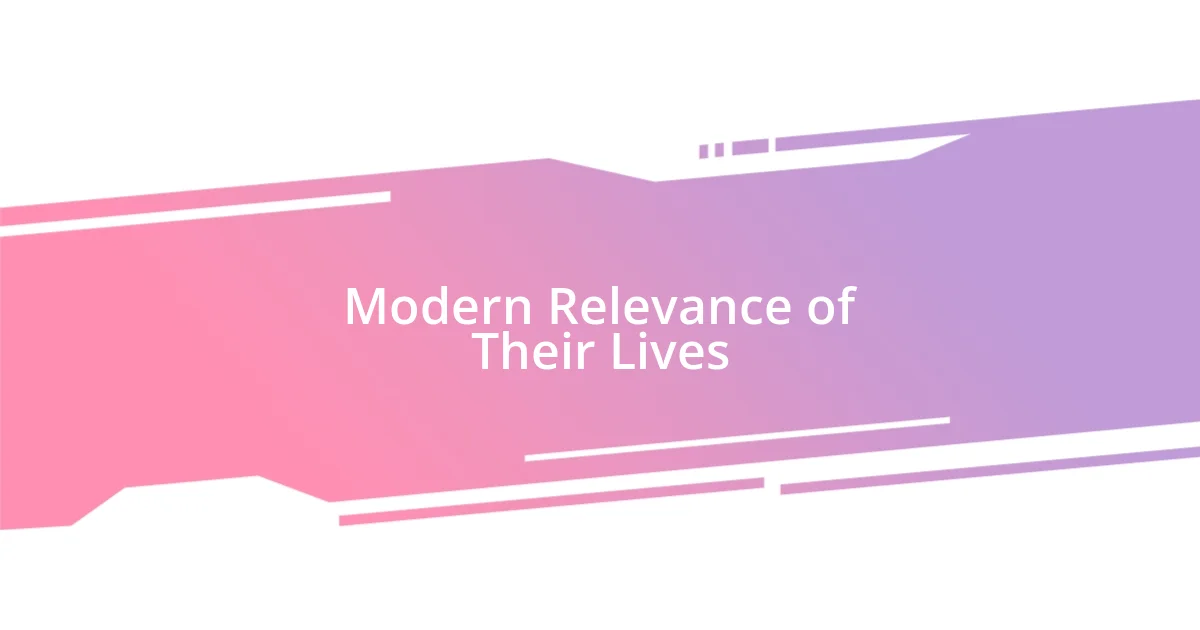
Modern Relevance of Their Lives
As I think about how the lives of historical figures influence our modern world, I can’t help but feel a sense of urgency. Recently, while volunteering at a local shelter, I remembered Malala Yousafzai’s incredible courage in advocating for girls’ education. Her story ignited a fire in me to push for greater awareness on such issues within our community. How can we harness her passion to embark on initiatives that uplift others today?
In another instance, I found myself captivated by the impact of Eleanor Roosevelt’s dedication to human rights during a panel discussion. The panelists spoke passionately about the relevance of her work in the face of today’s global challenges. It made me realize that her advocacy was not just historical; it’s a beacon for us to aspire to create inclusive policies that ensure everyone’s voice is heard. What steps can we take in our own spaces to mirror her commitment to rights and equality?
Reflecting on the resilience of figures like Rosa Parks, I’ve come to understand the power of standing firm in one’s convictions. Just last week, during a heated discussion about social justice, I felt her spirit compelling me to voice my thoughts, despite the discomfort of dissent. This experience made me ponder: How often do we shy away from difficult conversations that could lead to change? Parks teaches us that sometimes, it’s essential to take a stand—even when it’s uncomfortable—to ignite meaningful dialogues in our lives.
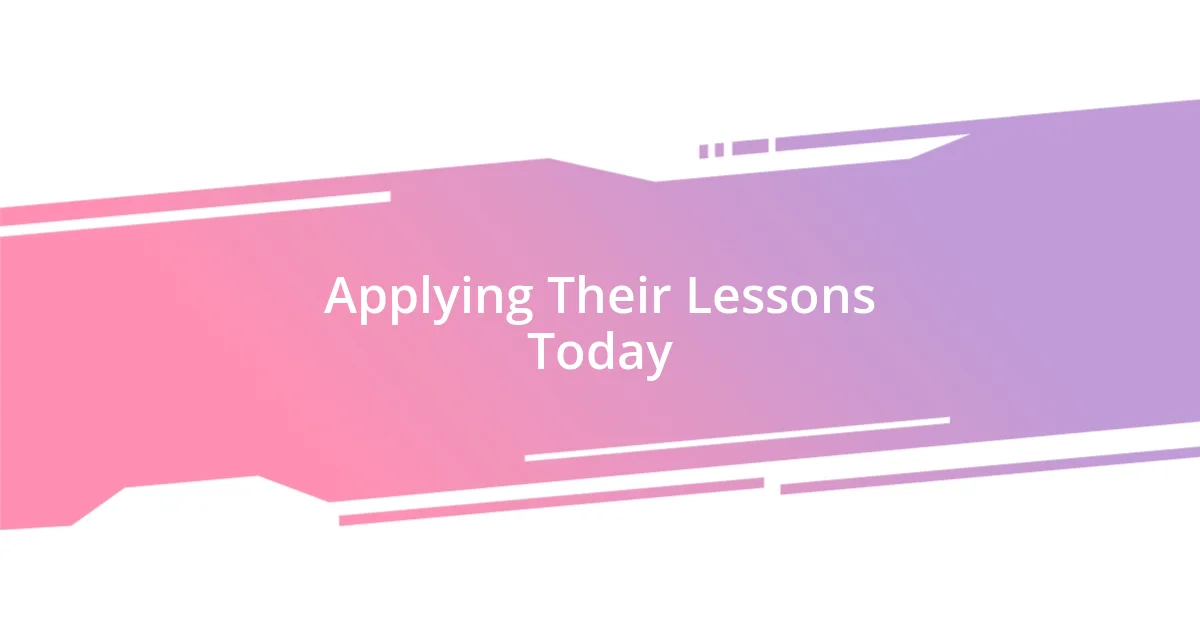
Applying Their Lessons Today
It’s fascinating to connect historical lessons with our everyday lives. The other day, I was mentoring a younger colleague who was struggling with self-doubt. I remembered the story of Amelia Earhart and her relentless pursuit of her dreams despite societal pressures. I shared with her that Earhart’s courage to break barriers taught me that embracing our true selves can lead to incredible possibilities. How often do we hold back our aspirations due to fear? It’s a reminder that daring to be bold can open doors we never thought possible.
I also think about the impact of figures like Martin Luther King Jr. whenever I witness inequality firsthand. In a recent community meeting, I recalled King’s vision of a world where everyone is judged not by their skin color but by their character. This powerful vision has inspired me to speak up when I see injustice. I asked myself, “Am I doing enough to honor his legacy?” It spurs me to actively engage in discussions that promote equality and equity—each conversation becomes an opportunity to contribute to a more inclusive future.
Then there’s the sobering lesson from Gandhi about nonviolent resistance. Just last week, I found myself in a debate that quickly grew heated. Remembering Gandhi’s approach, I chose to step back and listen instead of retaliating. It struck me—how easily we can escalate tensions, yet a calm demeanor can foster understanding. Isn’t it worth considering how our reactions can either build bridges or create chasms? Gandhi’s legacy encourages us to embrace peace not just as a concept, but as a daily practice in our interactions.












